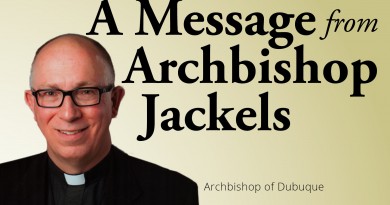Summary reflection 5: Unity in the church
By Archbishop Michael Jackels
Witness Publisher
The following is a summary reflection of the fifth talk given by Father Raniero Cantalamessa to the US bishops during their 2019 retreat:
We begin by being with Jesus, being taught by him, and following his lead.
And Jesus would have us follow his lead of unity, praying that his followers would be one, and that Church leaders would be agents of unity in the Church.
It’s important to note a few things about unity in the Church:
· It’s the Spirit’s gift, with which Church members cooperate to make unity a reality;
· Uniformity is not the same as unity, which in fact requires diversity;
· Unity and diversity are built up by humility, gentleness, patience, and forgiveness;
· Another person’s diverse interests or abilities completes, not competes, with ours.
This last point is important, especially when members of the Church quarrel with each other over what the priorities should be, or over the best way to tackle the priority.
For example, Church members might become divided and at odds with each other because one group identifies ending abortion as the priority, while another group thinks it’s more important to advocate for the things people need to live in dignity.
Or Church members might become divided and at cross purposes over the preferred method for tackling a priority, like NFP teachers, who all do a good and much-needed work, but sometimes denigrate one method in favor of promoting their own.
But it needn’t be that way; in fact, shouldn’t be that way.
Rather, pro-life folk and social justice advocates, for example, should be grateful that others are taking care of other important concerns that they don’t have the time for.
Likewise, people who differ about the means to address a need, like teaching NFP, should be grateful that a diversity of methods makes it more accessible to more people.
Church members cooperate to make Spirit-inspired unity a reality by means of the exercise of humility, when diverse groups recognize that another’s interests and abilities doesn’t compete with their own, but rather completes them.
Spirit-inspired unity is also built up by tearing down obstacles that separate people, when they practice forgiveness, which includes a number of exercises, such as:
Presume the best of the other person.
Give the other person the benefit of the doubt.
Look for ways to excuse the other person for what you see or hear.
As Jesus teaches: “Do not judge, and you will not be judged. Do not condemn, and you will not be condemned. Forgive, and you will be forgiven.” (Luke 6:37)
Are you grateful for the diverse abilities and interests of others? Do you readily forgive?


